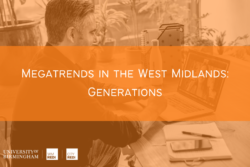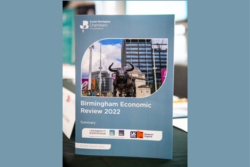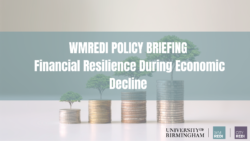Steve Barwick writes about the approaches of the UK’s two major political parties to University R&D and Innovation. City-REDI / WMREDI, University of Birmingham recently hosted fringe meetings at both the Labour and Conservative Party Conferences in order to gauge and explore the respective political party’s approach to university R&D and innovation, including its role … Continue reading “Political Party Approaches to University R&D and Innovation in the UK”
Megatrends and the West Midlands: Generations
Liam O’Farrell examines the age-old trope of intergenerational conflict. Does the evidence support the idea of generations at war or is categorising people by age a poor way of understanding our society? This article is part of larger project looking at Megatrends in the West Midlands. Megatrends are major movements or patterns or trends that … Continue reading “Megatrends and the West Midlands: Generations”
West Midlands Impact Monitor – 28th October 2022
Rishi Sunak is now UK Prime Minister. Concerns about inflation remain paramount for businesses, households and individuals. Russia has continued its targeted attack on Ukrainian energy supplies since last Monday, with an estimated 1.5m households now without electricity. Almost a third of Ukraine’s power stations and other energy-generating facilities having been destroyed in the attacks … Continue reading “West Midlands Impact Monitor – 28th October 2022”
The Launch of the Birmingham Economic Review 2022
On 20 October 2022, a launch event was held for the Birmingham Economic Review. This blog provides a summary of some of the key points to come out of the event. The Birmingham Economic Review (BER) is produced by City-REDI / WMREDI, the University of Birmingham and the Greater Birmingham Chambers of Commerce. It is … Continue reading “The Launch of the Birmingham Economic Review 2022”
Megatrends and the West Midlands: Health and Urban Greenspace
Urban greenspace typically refers to public parks, street verges, and sports grounds owned by the local council. Ros McDermott argues that urban greenspace is a resource for health, and the West Midlands Combined Authority (WMCA) should ensure equitable access to these spaces with a particular focus on people hit hardest by the pandemic. This article … Continue reading “Megatrends and the West Midlands: Health and Urban Greenspace”
WMREDI Policy Briefing: Financial Resilience During Economic Decline
In this policy briefing, Dr Amir Qamar, Dr Emma Gardner, Professor Anne Green and Professor Simon Collinson review the financial health of the largest 50 manufacturing firms within the West Midlands. Introduction The ongoing impact of the UK’s departure from the EU, the aftermath of the pandemic, and the recent depreciation of the pound provide … Continue reading “WMREDI Policy Briefing: Financial Resilience During Economic Decline”
Exploring Factors Influencing the Adoption of Low-Carbon and Renewable Technologies in Domestic Buildings in Birmingham
The Energy Crisis is on everyone’s minds, to raise awareness of National Energy Saving Week, Annum Rafique discusses the factors influencing the adoption of low-carbon and renewable technologies in domestic buildings in Birmingham. Climate change has been recognised as a global challenge. To combat climate change, the UK government has made ambitious targets for the … Continue reading “Exploring Factors Influencing the Adoption of Low-Carbon and Renewable Technologies in Domestic Buildings in Birmingham”
Megatrends in the West Midlands – Local Living
Gina Hunt examines the megatrend of local living, brought on by Covid-19, causing people to stay at home or in their own locality, increasing homeworking and spending money locally in their neighbourhoods. This article is part of larger project looking at Megatrends in the West Midlands. Megatrends are major movements or patterns or trends that … Continue reading “Megatrends in the West Midlands – Local Living”
West Midlands Impact Monitor – 14th October 2022
An interesting fact: marmalade has seen a rapid rise in sales surging by 18%, as the nation paid its respects to the Queen. Sales of supermarket own brands continue to surge in an effort to battle the cost-of living crisis. Sales of wonky fruit and vegetables have soared 38% and Lidl is the fastest growing … Continue reading “West Midlands Impact Monitor – 14th October 2022”
International Trade and Supply Chain Disruptions in the Light of the Russian-Ukraine war
With the Russian invasion of Ukraine, both countries reduced their trade with the world, and supply chains were disrupted. Maryna Ramcharan looks at UK international trade with both countries and the subsequent supply chain disruptions. International trade in the UK has a negative trade balance. Imports from Ukraine accounted for 0.2% of all goods imports. … Continue reading “International Trade and Supply Chain Disruptions in the Light of the Russian-Ukraine war”











